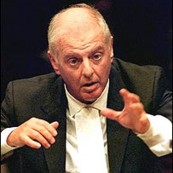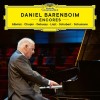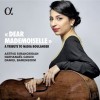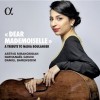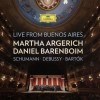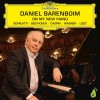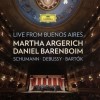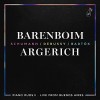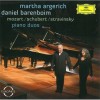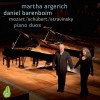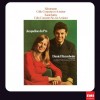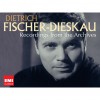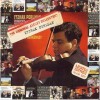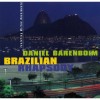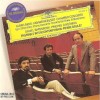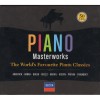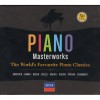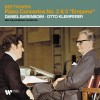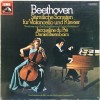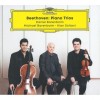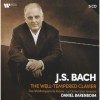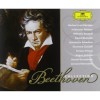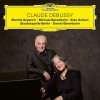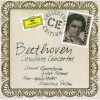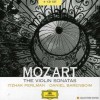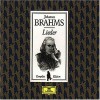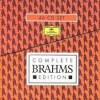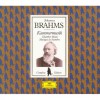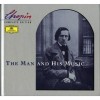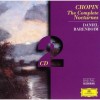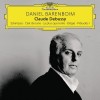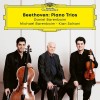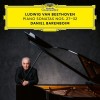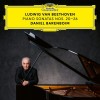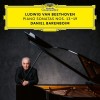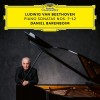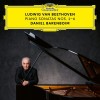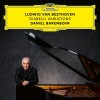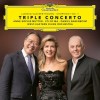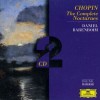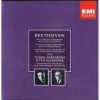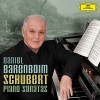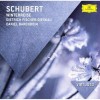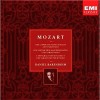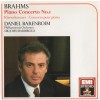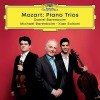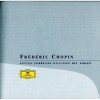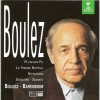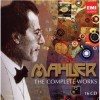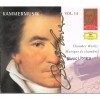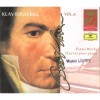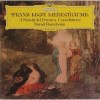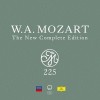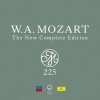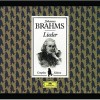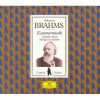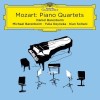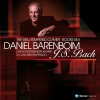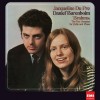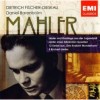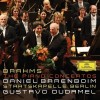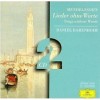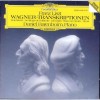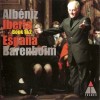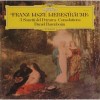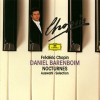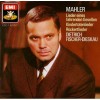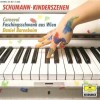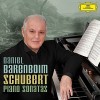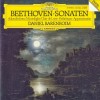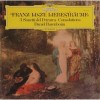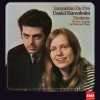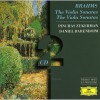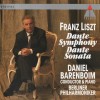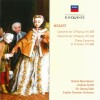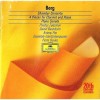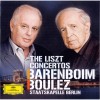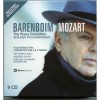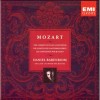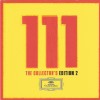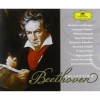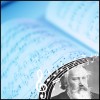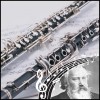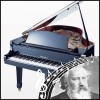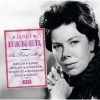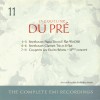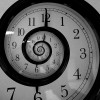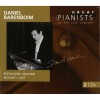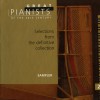| Voice/Instrument: | Pianoforte |
Biography
Daniel Barenboim was born in Buenos Aires in 1942 to parents of Jewish Russian descent. He started piano lessons at the age of five with his mother, continuing to study with his father who remained his only other teacher. In August 1950, when he was only seven years old, he gave his first official concert in Buenos Aires.
Important influences in his development as a musician included Artur Rubinstein and Adolf Busch, both of whom performed in Argentina. The Barenboim family moved to Israel in 1952. Two years later, in the summer of 1954, the parents brought their son to Salzburg to take part in Igor Markevich's conducting classes. During that same summer he also met Wilhelm Furtwängler, played for him and attended some of the great conductor's rehearsals and a concert. Furtwängler subsequently wrote a letter including the words "the eleven year-old Barenboim is a phenomenon …" This phrase was to open many doors to Daniel Barenboim for a long time to come. In 1955 the young Daniel Barenboim studied harmony and composition with Nadia Boulanger in Paris.
Barenboim made his debut as a pianist in Vienna and Rome in 1952, in Paris in 1955, in London in 1956 and in New York in 1957 with Leopold Stokowski and the Symphony of the Air. From then on, he made annual concert tours of the United States and Europe. He toured Australia in 1958 and soon became known as one of the most versatile pianists of his generation.
He made his first gramophone recordings in 1954 and soon began recording the most important works in the piano repertoire, including complete piano sonatas cycles of Mozart and Beethoven and concerto cycles of Mozart, Beethoven (with Otto Klemperer), Brahms (with Sir John Barbirolli) and Bartók (with Pierre Boulez).
During the same period, Barenboim began to devote more time to conducting. His close relationship with the English Chamber Orchestra which began in 1965 lasted over a decade. During this time they performed frequently in England with Barenboim as both conductor and piano soloist and went on tour in Europe, the United States, Japan, Australia and New Zealand. Following his conducting début with the New Philharmonia Orchestra in London in 1967, Barenboim began to conduct all the leading European and American symphony orchestras. Between 1975 and 1989 he was Music Director of the Orchestre de Paris, his tenure marked by a commitment to contemporary music including works by Lutoslawski, Berio, Boulez, Henze, Dutilleux, Takemitsu and others.
Daniel Barenboim has always been active as a chamber musician, performing with, among others, cellist Jacqueline du Pré (his late wife), Gregor Piatigorsky, Itzhak Perlman and Pinchas Zukerman. Collaborations with illustrious singers have included Dietrich Fischer-Dieskau, Thomas Quasthoff, Rolando Villazón and Dorothea Röschmann. In recent years he has performed chamber music at the Jerusalem International Chamber Music Festival and with members of the Staatskapelle Berlin.
Daniel Barenboim made his opera conducting début in 1973 with a performance of Mozart's Don Giovanni at the Edinburgh International Festival. In 1981 he made his début at the Bayreuth Festival, where he has conducted Tristan und Isolde, the Ring cycle, Parsifal and Die Meistersinger.
In 1991 he succeeded Sir Georg Solti as Music Director of the Chicago Symphony Orchestra, with whom he enjoyed countless successes in all the world's great concert halls for fifteen years. At the conclusion of his tenure in June 2006, the CSO musicians adopted a resolution naming him "our honorary conductor for life." In 1992 he became General Music Director of the Deutsche Staatsoper Berlin (German State Opera Berlin). In the autumn of 2000, the Staatskapelle Berlin appointed him Chief Conductor for Life.
Barenboim continues to appear as a regular guest conductor with the Berlin Philharmonic and Vienna Philharmonic orchestras. In 2006 he was named Maestro Scaligero at La Scala, Milan, where he conducted Patrice Chéreau’s acclaimed production of Tristan und Isolde in December 2007. Barenboim is a prolific recording artist and has made recordings since 1954 for Westminster, EMI, Deutsche Grammophon, Decca, Philips, Sony Classical (CBS Masterworks), BMG, Erato Disques and Teldec Classics International. He has won multiple Grammy Awards over the years.
In addition to Barenboim’s indisputable musical authority, he has become increasingly vocal in non-musical issues over the years. A Jew born during the Second World War and an Israeli by nationality, he has worked closely over many years with three German orchestras - the Berlin Philharmonic, the Staatskapelle Berlin and the Bayreuth Festival Orchestra in an atmosphere of mutual affection and respect.
In the early 1990s, a chance meeting between Barenboim and the late Palestinian-born writer and Columbia University professor Edward Said in a London hotel lobby led to an intensive friendship that has had both political and musical repercussions. These two men, who should have been poles apart politically, discovered in that first meeting, which lasted for hours, that they had similar visions for the future of potential Israeli/Palestinian cooperation. They decided to continue their dialogue and to collaborate on musical events to further their shared vision of peaceful co-existence in the Middle East. This led to Barenboim's first concert on the West Bank, a piano recital at the Palestinian Birzeit University in February 1999. It also led to a workshop for young musicians from the Middle East that took place in Weimar, Germany, in August 1999: this group was to become the West-Eastern Divan Orchestra.
The West-Eastern Divan Workshop took two years to organize and involved talented young musicians between the ages of 14 and 25 from Egypt, Syria, Lebanon, Jordan, Tunisia and Israel. The idea was that they would come together to make music on neutral ground with the guidance of some of the world's best musicians. Weimar was chosen as the site for the workshop because of its rich cultural tradition of writers, poets, musicians and creative artists and because it was the 1999 European cultural capital. Barenboim wisely chose two concertmasters for the orchestra, an Israeli and a Lebanese. There were some tense moments among the young players at first, but after being coached by members of the Berlin Philharmonic, the Chicago Symphony and the Staatskapelle Berlin, and having master classes with the cellist Yo-Yo Ma and nightly cultural discussions with Said and Barenboim, the young musicians worked and played in increasing harmony.
The West-Eastern Divan Workshop was held again in Weimar in the summer of 2000 and in Chicago in the summer of 2001. It has since found a permanent home in Seville, Spain, where it has been based since 2002. Each summer, following their workshop, the West-Eastern Divan Orchestra gives public concerts; to date it has performed in Europe and North and South America, including appearances at the BBC Proms and the Edinburgh, Lucerne and Salzburg festivals. In 2005, they performed a historic concert in the Cultural Palace in Ramallah, which was broadcast on television internationally and recorded on DVD. In December 2006, the West-Eastern Divan Orchestra went to the U.S.A., performing at Carnegie Hall and ending the tour with a farewell concert at the United Nations for outgoing Secretary General Kofi Annan. In 2007, the West-Eastern Divan Orchestra was invited to be in residence at the Salzburg Festival.
Edward Said passed away in 2003 but his partnership with Daniel Barenboim lives on through the West-Eastern Divan Orchestra and through the Barenboim-Said Foundation, which promotes music and co-operation through projects targeted at young Arabs and Israelis. In January 2005, Daniel Barenboim delivered the first Edward Said Lecture at Columbia University in New York City. Said’s widow Mariam continues to actively support and work for the orchestra and the Barenboim-Said Foundation.
Mr. Barenboim is keen to draw young people to music, believing in the transformative power of music. To this end, he was instrumental in founding music kindergartens in Ramallah and Berlin in 2004 and 2005 respectively. Through the Seville-based Barenboim-Said Foundation and his own Berlin-based Barenboim Foundation, he has inspired the creation of an Early Childhood Music Education Project, a Music Education Project in the Middle East and an Academy of Orchestral Studies in Seville. Both foundations continue to support musical education in the West Bank and in Nazareth, where instrumental lessons are given at the newly opened Edward Said Conservatory, headed by Nabeel Abboud-Ashkar, a violinist from the West-Eastern Divan Orchestra. On March 28th, 2008, Barenboim gave a special concert in Jerusalem with young Israeli and Palestinian musicians on the occasion of Israel’s 60th anniversary.
In October 2002 Daniel Barenboim and Edward Said jointly received Spain's prestigious Prince of Asturias Concord Prize for their work in founding the West-Eastern Divan Workshop. Mr. Barenboim was also named an honorary citizen of Spain. In November 2002 he was awarded the Tolerance Prize by the Protestant Academy of Tutzing, in southwestern Germany, for his efforts to bring Palestinians and Israelis together through music. The same month, the president of Germany awarded Mr. Barenboim the Grosses Bundesverdienstkreuz, the highest honor given to someone who is not a head of state. In 2004, Mr. Barenboim received the Buber-Rosenzweig Medal, the Wolf Prize for the Arts in the Knesset in Jerusalem and the Haviva Reik Peace Award. In 2005, he won the Special Ambassador of Music Prize of Echo Klassik and was named the 2006 Charles Eliot Norton Professor of Poetry at Harvard University where he delivered six lectures in autumn 2006. Also in 2006, Daniel Barenboim won the Kulturgroschen award, the Peace Prize from the Korn and Gerstenmann Foundation and the Music Prize of the Ernst von Siemens Music Foundation. He was the first performer ever chosen to deliver the prestigious BBC Reith Lectures, which he delivered in London, Chicago, Berlin and Jerusalem; they were broadcast in the UK and on the BBC World Service.
In 2007, Daniel Barenboim was awarded the Goethe Medal by the Goethe Institute and was given an Honorary Doctorate of Music degree by Oxford University; he was named Commandeur de la légion d’honneur by the French President Jacques Chirac and received the Praemium Imperiale award in Japan. United Nations Secretary General Ban Ki Moon named Barenboim United Nations Messenger of Peace in September 2007. In the same year, he was also awarded the Royal Philharmonic Society Gold Medal, one of the most prestigious honors in classical music. In May 2008, he became an honorary citizen of the city of Buenos Aires (ciudadano ilustre), and in February 2009, he was awarded the Moses Mendelssohn Medal for his contribution to tolerance and international understanding.
Mr. Barenboim is the author of A Life in Music and Everything is Connected (US title: Music Quickens Time). He is the co-author of Parallels and Paradoxes: Explorations in Music and Society, a series of conversations between Daniel Barenboim and Edward Said, and Dialoghi su musica e teatro: Tristano e Isotta with Patrice Chéreau, a lengthy dialogue on the relationship between stage director and conductor in the production of the opera Tristan und Isolde.
Discography
Composers' compositions
Ludwig van Beethoven
Beethoven - The Complete Symphonies and Piano Concertos - Barenboim, KlempererSymphony / Symphonic music
Ludwig van Beethoven
Complete Beethoven Edition Vol.1-2 - Symphonies | ConcertosSymphony / Symphonic music





